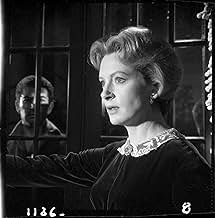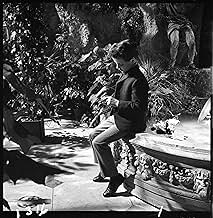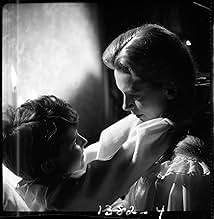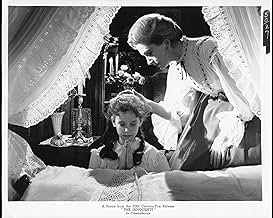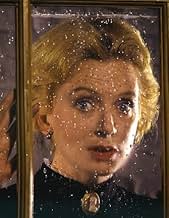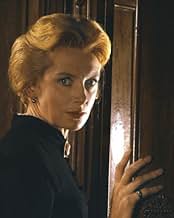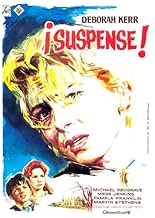VALUTAZIONE IMDb
7,7/10
34.799
LA TUA VALUTAZIONE
Una giovane governante si convince che la casa è posseduta.Una giovane governante si convince che la casa è posseduta.Una giovane governante si convince che la casa è posseduta.
- Regia
- Sceneggiatura
- Star
- Nominato ai 2 BAFTA Award
- 4 vittorie e 5 candidature totali
Recensioni in evidenza
Amid the releases of numerous Hammer films, Jack Clayton directed a different kind of horror film, more of a psychological thriller. "The Innocents" casts Deborah Kerr as Miss Giddens, a woman hired to be a governess for two children in a manor in the English countryside. At first, the children are happy to have Miss Giddens around. But as time passes, Miss Giddens begins to suspect that something is not quite right...or is it all in her mind? The movie, based on a short story by Henry James, has a lot going for it. The black and white cinematography alone creates a significant Gothic feeling. The setting certainly adds to that: an antiquated mansion in which just about anything could be hiding; the house could easily be the star of the movie. But Deborah Kerr's facial expressions are as creepy as anything that happens in or around the house. Her expressions truly serve to make the audience wonder how much of the terror is real or in her mind. And of course the girl's song is also pretty sinister.
Watching the movie, I could see some similarities to "The Shining" and "The Others". It just goes to show that real horror comes not from blood and guts, but from what the viewer doesn't know. There were a few scenes in this movie that made my blood freeze a little bit. Without a doubt it was a solid achievement for Clayton, Kerr, and also Truman Capote (who co-wrote the screenplay). Definitely one that I recommend.
Watching the movie, I could see some similarities to "The Shining" and "The Others". It just goes to show that real horror comes not from blood and guts, but from what the viewer doesn't know. There were a few scenes in this movie that made my blood freeze a little bit. Without a doubt it was a solid achievement for Clayton, Kerr, and also Truman Capote (who co-wrote the screenplay). Definitely one that I recommend.
Director Jack Clayton's masterpiece is a study of deepest dread. Its horror is the cinematic equivalent of rising damp.
Deborah Kerr accepts a job as the governess of two strange children (Martin Stephens and Pamela Franklin) and becomes convinced that they occupy a world haunted by repressed memories and the restless dead.
Martin Stephens' performance as the unfathomable Miles is extraordinary. The child projects a physical authority rare for his years. His dialog exchanges with Kerr run the gamut from highly amusing to deeply disturbing.
Clayton's greatest achievement is the way he subverts common household settings to the point where they become arenas of fear.
The sound design is chilling, conjuring sudden terror and thrusting us into the complex mechanics of the Kerr character's growing paranoia.
Strikingly shot and lit, the film is a textbook example of grave cinematic suggestion.
Deborah Kerr accepts a job as the governess of two strange children (Martin Stephens and Pamela Franklin) and becomes convinced that they occupy a world haunted by repressed memories and the restless dead.
Martin Stephens' performance as the unfathomable Miles is extraordinary. The child projects a physical authority rare for his years. His dialog exchanges with Kerr run the gamut from highly amusing to deeply disturbing.
Clayton's greatest achievement is the way he subverts common household settings to the point where they become arenas of fear.
The sound design is chilling, conjuring sudden terror and thrusting us into the complex mechanics of the Kerr character's growing paranoia.
Strikingly shot and lit, the film is a textbook example of grave cinematic suggestion.
8cuz
What makes a good chiller? Gore, special effects? No, as director Jack Clayton proves here, it's atmosphere, combined with the sounds of horror, that makes the difference. Granted, I've seen just about every Elm Street and Friday the 13th instalment, but "The Innocents" proves that what you don't see can scare you the most. Deborah Kerr is in fine form as an English governess who is sent to a remote mansion in the country to look after two young orphans. Their "uncle" in London doesn't have time for them. Kerr slowly begins to realize there's something not quite right with the young boy and girl. Their thoughts and actions are not consistent with the behavior of pre-teens. There's a dark secret, and Kerr sets out to discover it. We do see the ghosts, but it's when Kerr searches the house for the sources of strange noises and voices that we really feel a chill. "The Innocents" also makes great use of its black and white photography. I can't imagine it working as well in color (are you listening, Gus Van Sant?). Shadows just seem creepier in black and white. The children are well played by Martin Stephens and Pamela Franklin. Franklin was 11 when she made this film, and as an adult she would go on to star in another excellent haunted house movie, "The Legend of Hell House." It's a shame that Hollywood has stopped making movies like "The Innocents." Perhaps audiences used to Halloween-style slashers, "Scream" and "I Know What You Did Last Summer" would be demanding blood and guts. Yes, "Scream" was, pardon the pun, a cut above. It raised the slumping horror bar to new heights, and then "I Know..." ran under that bar, but that's another story. If you want genuine chills rather than cheap thrills, you can't do much better than "The Innocents."
The Innocents (1961)
The title loads this gun a little differently than the original from the long short story (or novella) by Henry James--The Turn of the Screw. But Jack Clayton's version of the story gets at the point with great ambiguity--uncertainty is key, and the suspense is partly under pressure because we don't quite know which side to take.
I can't say more, of course, because even a hint of a hint will start a viewer off on the wrong foot. But know that The Innocents is vigorously filmed in widescreen black and white, that Deborah Kerr, always a cool actress, is perfectly cool here (some might just say British, but she has no Julie Andrews in her governessing, and no Elizabeth Taylor in her at all). The two kids are both rather poised and charming as well as chilling, the boy especially intriguing for his precociousness (and preciousness). We empathize with all three equally, and yet, as you see, you can't quite see the events from their three pairs of eyes equally. Something is wrong, and you wait to see what, and how it will be revealed.
If it ever is. One of the brilliant things about Henry James is how you finish one of his books (the novels are better than the stories for this, I think) knowing what has happened but not knowing completely why. I mean, it all makes sense and feels right, but it feels suspended with an air of lingering needs. So you end up thinking about it later. As you will with this film.
There are some moments of special effects that are very well done even if a kind of 1950s/60s style of overlapping images and dreamer/dreamed simultaneousness. And the ghosts, not to give anything away, are pretty matter of fact. This is more an appreciation than a complaint, because the lack of gore, of cheap surprise, or of obvious scare tactics makes the movie a relief, and a bit of cinematic magic.
The title loads this gun a little differently than the original from the long short story (or novella) by Henry James--The Turn of the Screw. But Jack Clayton's version of the story gets at the point with great ambiguity--uncertainty is key, and the suspense is partly under pressure because we don't quite know which side to take.
I can't say more, of course, because even a hint of a hint will start a viewer off on the wrong foot. But know that The Innocents is vigorously filmed in widescreen black and white, that Deborah Kerr, always a cool actress, is perfectly cool here (some might just say British, but she has no Julie Andrews in her governessing, and no Elizabeth Taylor in her at all). The two kids are both rather poised and charming as well as chilling, the boy especially intriguing for his precociousness (and preciousness). We empathize with all three equally, and yet, as you see, you can't quite see the events from their three pairs of eyes equally. Something is wrong, and you wait to see what, and how it will be revealed.
If it ever is. One of the brilliant things about Henry James is how you finish one of his books (the novels are better than the stories for this, I think) knowing what has happened but not knowing completely why. I mean, it all makes sense and feels right, but it feels suspended with an air of lingering needs. So you end up thinking about it later. As you will with this film.
There are some moments of special effects that are very well done even if a kind of 1950s/60s style of overlapping images and dreamer/dreamed simultaneousness. And the ghosts, not to give anything away, are pretty matter of fact. This is more an appreciation than a complaint, because the lack of gore, of cheap surprise, or of obvious scare tactics makes the movie a relief, and a bit of cinematic magic.
Miss Giddens (Deborah Kerr), a nineteenth century British governess, is appointed to take care of two children, Flora (Pamela Franklin) and Miles (Martin Stephens). Upon arriving at the bleak mansion she meets the housekeeper (Megs Jenkins) and also Flora. Miles arrives a few days later from school. The children seem like little angels but, following a series of bizarre events and examples of the children's wicked impulses, Miss Giddens begins to suspect that all is not what it seems.
This dark and atmospheric tale is a wonderful example of how to create an admirable horror movie that, although has violent undertones, features very little violence when all is said and done. The Innocents' is certainly a psychological horror movie which leaves in doubt how much of the inexplicable happenings are supernatural, and how much is in the mind of the protagonist, Miss Giddens. Director Jack Clayton uses some astonishing visual trickery and ghostly effects to create and maintain a very unsettling atmosphere, almost from the very beginning. A number of effective ghostly apparitions are displayed on screen during the movie from varying distances which gives The Innocents' a constant, foreboding atmosphere. The way some scene changes blend with the end of the previous scene are rather disconcerting and almost dream like as there are long lingering images, once again, wholly adding to the effect. Some of the dialogue may seem a little unrealistic, but in general the movie is well scripted and features a few very dramatic scenes thanks to some delightfully written dialogue and strong acting performances. William Archibald and Truman Capote both won awards for their script writing.
The only real fault with The Innocents' is how fast the film moves along. Miss Giddens seems to realise the truth of what is happening all too quickly. This does not make The Innocents' less enjoyable, but it would have been nice to have had an extra ten minutes or so explaining the story to us a bit more. The Innocents' has a sustained tone of dread throughout the movie. It seems that Miss Giddens is unable to move without being confronted by some spectre or seeing some rather peculiar behaviour exhibited from the children. I'd compare the dark atmosphere with that of The Haunting' (1963), both movies are comparable in the way they are presented and are both aesthetically pleasing. The acting was of a high standard, though one must forgive the two young performers if they occasionally seemed to overact. Martin Stephens was very good as Miles, playing his sinister part with an awful power, even though the character's superciliousness became somewhat of an annoyance. Megs Jenkins was also delightful as the anxious housekeeper Mrs. Grose. From the moment Mrs. Grose is first introduced the viewer can begin to suspect something. Jenkins came across as a friendly, but scared, woman who is desperate to maintain decorum in the house. A fine performance suited her character marvellously. One must also mention Deborah Kerr's fine performance as Miss Giddens as she played it with the right balance of inquisitiveness and fear. Deborah's dramatic performance certainly helped make this movie fantastic and one sympathises with her deeply as the film ends on the sombre and heartbreaking note that it does.
The Innocents' is an elegant and stylish movie that is certainly worth watching. Fans of The Omen' and Village of the Damned' should enjoy this as well as any fan of dark, atmospheric horror. A strong screenplay, fine performances and breathtaking visual trickery make this movie a very pleasing addition to the horror genre and I highly recommend it to all. The Innocents' was able to scoop a BAFTA Award (British Academy of Film and Television Awards) for Best British Film as well as a BAFTA nomination for Jack Clayton which he thoroughly deserved. My rating for The Innocents' - 8/10.
This dark and atmospheric tale is a wonderful example of how to create an admirable horror movie that, although has violent undertones, features very little violence when all is said and done. The Innocents' is certainly a psychological horror movie which leaves in doubt how much of the inexplicable happenings are supernatural, and how much is in the mind of the protagonist, Miss Giddens. Director Jack Clayton uses some astonishing visual trickery and ghostly effects to create and maintain a very unsettling atmosphere, almost from the very beginning. A number of effective ghostly apparitions are displayed on screen during the movie from varying distances which gives The Innocents' a constant, foreboding atmosphere. The way some scene changes blend with the end of the previous scene are rather disconcerting and almost dream like as there are long lingering images, once again, wholly adding to the effect. Some of the dialogue may seem a little unrealistic, but in general the movie is well scripted and features a few very dramatic scenes thanks to some delightfully written dialogue and strong acting performances. William Archibald and Truman Capote both won awards for their script writing.
The only real fault with The Innocents' is how fast the film moves along. Miss Giddens seems to realise the truth of what is happening all too quickly. This does not make The Innocents' less enjoyable, but it would have been nice to have had an extra ten minutes or so explaining the story to us a bit more. The Innocents' has a sustained tone of dread throughout the movie. It seems that Miss Giddens is unable to move without being confronted by some spectre or seeing some rather peculiar behaviour exhibited from the children. I'd compare the dark atmosphere with that of The Haunting' (1963), both movies are comparable in the way they are presented and are both aesthetically pleasing. The acting was of a high standard, though one must forgive the two young performers if they occasionally seemed to overact. Martin Stephens was very good as Miles, playing his sinister part with an awful power, even though the character's superciliousness became somewhat of an annoyance. Megs Jenkins was also delightful as the anxious housekeeper Mrs. Grose. From the moment Mrs. Grose is first introduced the viewer can begin to suspect something. Jenkins came across as a friendly, but scared, woman who is desperate to maintain decorum in the house. A fine performance suited her character marvellously. One must also mention Deborah Kerr's fine performance as Miss Giddens as she played it with the right balance of inquisitiveness and fear. Deborah's dramatic performance certainly helped make this movie fantastic and one sympathises with her deeply as the film ends on the sombre and heartbreaking note that it does.
The Innocents' is an elegant and stylish movie that is certainly worth watching. Fans of The Omen' and Village of the Damned' should enjoy this as well as any fan of dark, atmospheric horror. A strong screenplay, fine performances and breathtaking visual trickery make this movie a very pleasing addition to the horror genre and I highly recommend it to all. The Innocents' was able to scoop a BAFTA Award (British Academy of Film and Television Awards) for Best British Film as well as a BAFTA nomination for Jack Clayton which he thoroughly deserved. My rating for The Innocents' - 8/10.
Lo sapevi?
- QuizTo create such sharp visuals, director of photography Freddie Francis used lots of huge bright lamps. Deborah Kerr sometimes had to resort to wearing sunglasses between takes. He also had candles custom made with four or five wicks entwined to produce more light.
- BlooperAn obvious center back zipper in several of Miss Kerr's costumes, as well as in Mrs. Gross & Flora's costumes. The Innocents is set during the Victorian period, 1837-1901. Commercial zippers were not used in clothing until 1925.
- Citazioni
Miles: What shall I sing to my lord from my window? What shall I sing for my lord will not stay? What shall I sing for my lord will not listen? Where shall I go when my lord is away? Whom shall I love when the moon is arisen? Gone is my lord and the grave is his prison. What shall I say when my lord comes a calling? What shall I say when he knocks on my door? What shall I say when his feet enter softly? Leaving the marks of his grave on my floor. Enter my lord. Come from your prison. Come from your grave, for the moon is a risen. Welcome, my lord.
- Curiosità sui creditiThe film begins with a totally black screen and the sound of Flora singing for several seconds; then the 20th Century Fox logo fades in and out. The singing continues for a few seconds before the opening credits begin. As the credits display, we see an anguished Miss Giddens praying on the left side of the screen. Her actions are not explained until the film's climax.
- ConnessioniFeatured in Aweful Movies with Deadly Earnest: The Innocents (1974)
I più visti
Accedi per valutare e creare un elenco di titoli salvati per ottenere consigli personalizzati
Dettagli
- Data di uscita
- Paesi di origine
- Lingua
- Celebre anche come
- Posesión satánica
- Luoghi delle riprese
- Azienda produttrice
- Vedi altri crediti dell’azienda su IMDbPro
Botteghino
- Budget
- 430.000 £ (previsto)
- Lordo in tutto il mondo
- 30.221 USD
- Tempo di esecuzione1 ora 40 minuti
- Colore
- Proporzioni
- 2.35 : 1
Contribuisci a questa pagina
Suggerisci una modifica o aggiungi i contenuti mancanti




